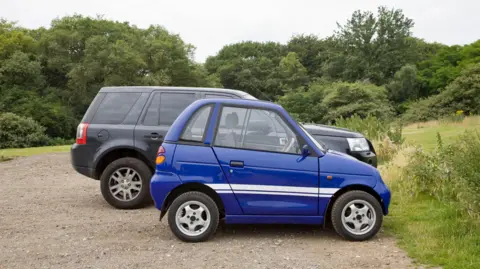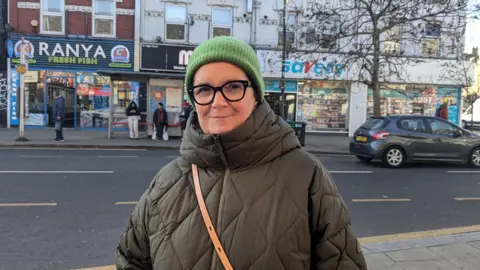 Getty Images
Getty ImagesIt’s a controversial topic that divides opinion: should people with bigger cars pay more for parking?
Cardiff has become the latest council to ponder the question. As part of a public consultation, it’s asking for views on whether residents with larger vehicles should pay more for permits.
“We’re consulting on the principle of whether it’s right… if you’re driving a larger or more polluting vehicle, to pay a bit more,” council leader Huw Thomas told the BBC this week.
“These are vehicles that take up more space, they cause more damage to our roads, and if they happen to hit a pedestrian they’re likely to cause more serious injuries,” he said.
Other councils, including Bristol, Oxford and Haringey in north London are also looking into the option of charging larger vehicles more.
So, back to Mr Thomas’s question: is it right?

We headed to Haringey to see what local residents thought.
“I think it’s a load of crap,” Nev says, adding he has grown weary of traffic-reducing and environmental policies in the borough.
“We’re already paying more if you’ve got a big car. You’re paying more tax, you pay more for petrol to fill it. That’s your business.”
But fellow resident Gary Oliva says: “If you can afford a large car, then you can afford to pay for it.
“Public transport in London is very, very good. If you want to get from A to B get on a bus, get on a train, get on the tube.”
However, Selin Akdenez, who is a single mum and drives an SUV, says parking in London is already expensive, and the prospect of paying more for residential parking is something that she couldn’t afford.
“I disagree because I have a child so I do have to have a bigger car,” she says. “My mother is really old. If she needs a GP appointment or dentist, I have to take her.”
 Getty Images
Getty ImagesA YouGov poll last year found 39% of adults thought there should be higher parking fees for bigger and heavier cars, while 53% thought all cars should have the same parking fees.
The split was much closer in London than in any other region, with 45% thinking bigger cars should pay higher fees, and 44% thinking they shouldn’t.
Heavier or longer?
But what do we actually mean by bigger?
In Haringey, where the price of a permit already varies depending on your car’s emissions, the council proposed adding a 5% surcharge for medium vehicles 4-4.49m long, and a 10% surcharge for large vehicles over 4.5m long.
To put that in context, a Kia Picanto would count as a small car, a Volvo V40 or BMW 1 Series medium, and an MG5 or Land Rover Discovery large.
Haringey’s public consultation has just closed. The council says no decisions have been taken on any of the proposals.
In Belgium, Brussels has a length-based system in place in certain parts of the city. A residential permit costs €25 (£21) per year but if your vehicle is over 4.9m long you pay an additional charge of €120 per year.
In Cardiff, weight is the factor under consideration, whether vehicles over 2.4 tonnes revenue weight should pay more, although no price has been suggested. Revenue weight refers to the maximum weight of a vehicle, including passengers, fuel and luggage.
In Autocar’s list of the best family SUVs, four out of the top five would exceed this limit – the Kia EV9, Land Rover Discovery Sport, Hyundai Santa Fe, and Volvo XC60.
Car weight is the model used in some French cities. Earlier this year, Parisians voted to triple parking rates for cars weighing 1.6 tonnes or more to €18 an hour in the inner city, although this does not apply to residents.
Size-based parking inevitable?
Oliver Lord is from the Clean Cities campaign group, which worked on the campaign in Paris arguing that SUVs are dangerous and bad for the environment.
He says it is “inevitable” that size-based parking charges will come to the UK, pointing to the fact that 60% of car sales in the UK last year were SUVs.
“These bigger cars not only burn more fuel, they take up more space,” he says.
Even big electric cars have issues because they take up more room and are more dangerous than smaller electric cars, he adds.
“If you’ve not only got more cars but the cars are bigger, how are you going to adapt your city to climate change?”
But Erin Baker, editorial director at AutoTrader, is against blanket policies based on size because she says cars can vary greatly. For instance, some models may be long or heavy but still be fuel-efficient.
“Yes it tends to be the bigger the car the heavier it is and so it’s less fuel-efficient. But it’s a clumsy way of looking at it,” she says.
She also says it’s not always the case that larger cars have wealthier owners.
“If you look at key workers or people who live outside the city – these are not two-car families, these are one car [households] because that’s what the family budget allows for. So it will be big – an estate or an SUV.”

Luke Bosdet from motoring organisation the AA says it is reasonable to charge more for vehicles that exceed the length of a standard parking space.
“I would think that vehicle length is a measure that residents would understand better and go along with, particularly with the squeeze on parking in residential streets.”
However, he says: “Other reasons for increased permit costs, such as fuel type or level of CO2 emissions are not. Other taxes, such as vehicle excise duty, company car tax, ULEZ (Ultra Low Emission Zone) and CAZ (Clean Air Zone) charges do that.”
‘Making money out of car users’
Any extra charges imposed on drivers would be seen as unfair, says Erin Baker.
“Consumers think: don’t penalise me, and don’t penalise me when the car industry is building bigger cars.”
Back in Haringey, resident Amanda Davies says the proposal to charge larger cars more to park “just adds to the fuel of the council being seen as making money out of car users”.
She has a Mini currently, but says if she did want to get a bigger car, she wouldn’t want to be penalised for that by having to pay more for parking.
“It’s a really tough one because yes we should discourage people to have cars in inner cities full stop, because they are huge polluters.
“However, some people are dependent on a car for work, for disability or for whatever reason – so I think it’s just about finding a balance.
“It’s an interesting topic because we don’t use our car that often, and now I’m considering that we should get rid of it.”
